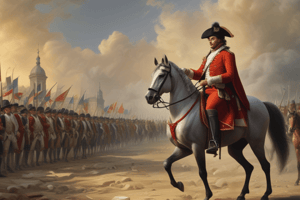Podcast
Questions and Answers
What event marked the beginning of the end for the Bourbon monarchy in France?
What event marked the beginning of the end for the Bourbon monarchy in France?
- The Tennis Court Oath
- The Estates-General
- The Declaration of the Rights of Man and Citizen
- The Storming of the Bastille (correct)
Which event led to the formation of the National Assembly during the French Revolution?
Which event led to the formation of the National Assembly during the French Revolution?
- The Estates-General (correct)
- The Tennis Court Oath
- The Storming of the Bastille
- The Declaration of the Rights of Man and Citizen
What event in 1789 solidified the commitment to creating a constitution for France?
What event in 1789 solidified the commitment to creating a constitution for France?
- The Estates-General
- The Declaration of the Rights of Man and Citizen
- The Tennis Court Oath (correct)
- The Storming of the Bastille
Which event was seen as a symbol of the tyranny of the French monarchy during the revolution?
Which event was seen as a symbol of the tyranny of the French monarchy during the revolution?
What key event took place on August 26, 1789, during the French Revolution?
What key event took place on August 26, 1789, during the French Revolution?
Which event during the French Revolution showcased the power and determination of the common people?
Which event during the French Revolution showcased the power and determination of the common people?
What marked the beginning of the Reign of Terror during the French Revolution?
What marked the beginning of the Reign of Terror during the French Revolution?
Which revolutionary faction used the guillotine extensively during the Reign of Terror?
Which revolutionary faction used the guillotine extensively during the Reign of Terror?
During which period was France marked by military defeats, economic hardship, and internal conflict?
During which period was France marked by military defeats, economic hardship, and internal conflict?
Who eventually overthrew the Directory and established the Consulate in France?
Who eventually overthrew the Directory and established the Consulate in France?
Which event ended with the rise of Napoleon Bonaparte to power?
Which event ended with the rise of Napoleon Bonaparte to power?
Which period in French history was influenced by Enlightenment philosophers like Jean-Jacques Rousseau and John Locke?
Which period in French history was influenced by Enlightenment philosophers like Jean-Jacques Rousseau and John Locke?
Flashcards are hidden until you start studying
Study Notes
The French Revolution: A Turbulent Time of Change
The French Revolution, a watershed moment in European history, took place from 1789 to 1799. This period of radical societal and political upheaval began as a quest for liberty, equality, and fraternity but quickly evolved into a complex and tumultuous era. To better understand this period, let's delve into some of the key events that shaped the French Revolution.
The Estates-General (1789)
The journey began with the calling of the Estates-General, a representation of the three estates (clergy, nobility, and commoners) of the French kingdom. The clergy and nobility, fearing erosion of their privileges, initially boycotted the meeting. However, the Third Estate, which comprised the majority of the French population, rallied and formed the National Assembly. The Tennis Court Oath, taken on June 20, 1789, pledged the National Assembly to continue their work until they provided a constitution for France.
Storming of the Bastille (July 14, 1789)
On July 14, 1789, the people of Paris stormed the Bastille, a royal fortress that had come to symbolize the tyranny of the monarchy. The fall of the Bastille signified the beginning of the end for the Bourbon monarchy and the rise of popular politics in France.
The Declaration of the Rights of Man and Citizen (August 26, 1789)
In August 1789, the National Assembly adopted the Declaration of the Rights of Man and Citizen, which outlined the fundamental rights of all French citizens. This document, influenced by Enlightenment philosophers such as Jean-Jacques Rousseau, John Locke, and Thomas Jefferson, laid the groundwork for the French Revolution's later developments.
Reign of Terror (1793-1794)
With the execution of King Louis XVI on January 21, 1793, the French Revolution entered a new phase, marked by the Reign of Terror. During this period, radical factions within the government, such as the Jacobins, sought to eliminate counter-revolutionaries and dissidents by using the guillotine, a device that became synonymous with the Reign of Terror.
Directory (1795-1799)
In the wake of the Reign of Terror, France entered the Directory, a period of political instability marked by military defeats, economic hardship, and internal conflict. The Directory was eventually overthrown by Napoleon Bonaparte in 1799, who established the Consulate and laid the groundwork for his own rise to power.
The French Revolution remains a fascinating and complex topic, and these events only scratch the surface of the period's rich and tumultuous history. While the French Revolution ended in the rise of Napoleon Bonaparte, the ideas and ideals it spawned continued to shape the world for centuries to come. As we remember the French Revolution, we see the interplay between the individual, the state, and the broader struggle for human rights and democracy that continues to be central to our world today.
Studying That Suits You
Use AI to generate personalized quizzes and flashcards to suit your learning preferences.




